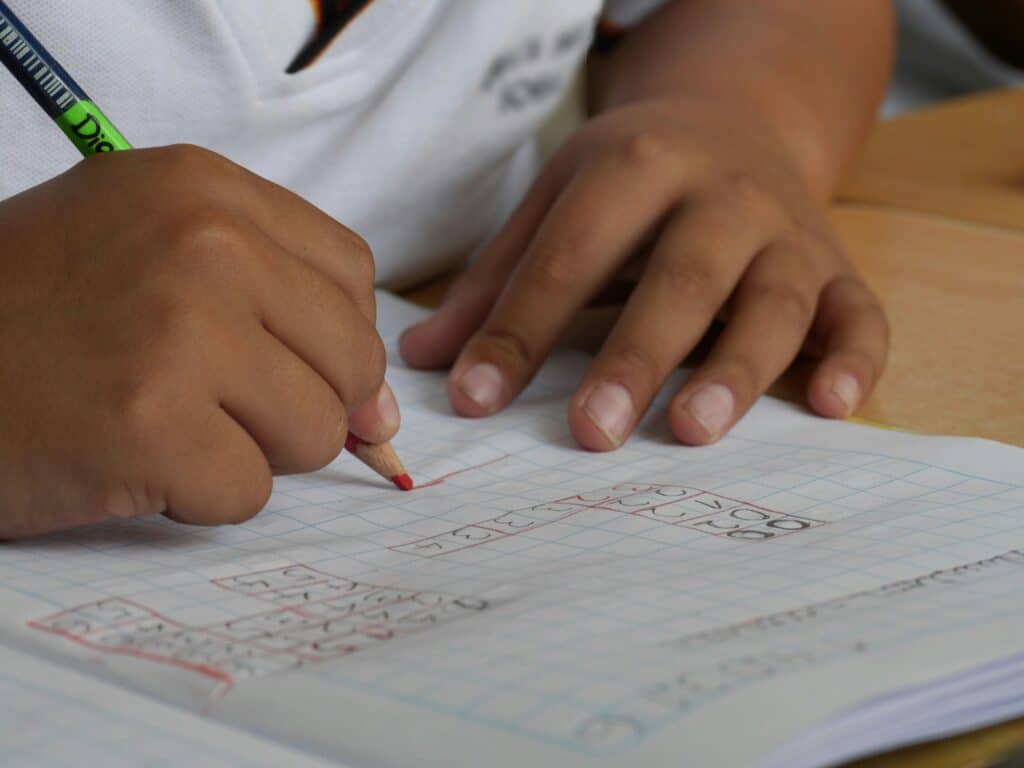Missing assignments: 8 ways to get caught up in school
A late-night wake-up call

You open your planner and feel the pile of missed work like a weight on your chest.
You tell yourself you’ll start tomorrow, again.
That loop is familiar, and you want out.
You aren’t alone. Research shows that delayed or missing school tasks often link to lower grades and rising stress. (Langberg et al. 2016)
Procrastination can appear early and affect wellbeing and school progress. (González-Brignardello 2023)
This article teaches how to get caught up on missing assignments with clear steps you can use tonight.
You’ll get short, practical tips that match real student life.
Each idea ties back to research and to what actually works for learners.
- Three quick things to try now:
- Pick one small assignment and finish it in 20 minutes.
- Email one teacher explaining your plan and request a deadline extension.
- Set a phone timer for focused work blocks of 25 minutes.
You’ll read tips that cover planning, communication, and study habits.
You’ll see simple strategies for procrastination tips and better productivity habits so you stop feeling behind.
By the end, you’ll have a clear plan to reduce late work and regain control.
Table of Contents: The 8 Tips
- Assess What’s Missing
- Prioritize Assignments by Deadline and Importance
- Break Tasks into Smaller Steps
- Use a Planner or Digital Tracker
- Set Specific Time Blocks for Catching Up
- Seek Help from Teachers or Peers
- Minimize Distractions While Working
- Reward Yourself for Progress
Tip 1: Assess What’s Missing

You may feel buried by unfinished work. Start by listing every missing task so you can see what you’re actually facing. This reduces stress and gives you a plan. how to get caught up on missing assignments. (Fernández-Alonso et al.)
Check online grade portals, teacher comments, and your notes to confirm what’s truly missing. Large studies show assignment strategies and clear inventories link to better grades. (Fernández-Alonso et al.)
Be honest about what you can finish today versus later. That clarity helps you decide what to prioritize without guessing. (Langberg et al.)
Steps:
- Write every missing assignment in one place with class and due date.
- Mark whether work is late, incomplete, or never started.
- Note missing materials or textbook pages for each task.
- Add teacher feedback or rubric notes beside each item.
- Check at least two sources (portal and notebook) for accuracy.
Once you finish this inventory, you’ll know which tasks are quick wins and which need more time. (Langberg et al.)
Extra strategies:
- Use a simple priority label: A (urgent), B (important), C (low).
- Highlight assignments requiring others’ input or group work.
- Keep the list visible where you study for constant reminders.
- Update your list every evening before bed.
Tip 2: Prioritize Assignments by Deadline and Importance
When you prioritize, you stop guessing and start finishing. Rank each missing task by due date and grade impact — that helps you focus on what matters most. how to get caught up on missing assignments. (Fernández-Alonso et al.)
If two tasks share a due date, pick the one with bigger grade weight first. Small, steady wins often rebuild momentum faster. (Langberg et al.)
Using incentives or small deadlines reduces procrastination and helps completion rates. Applying short deadlines can lower delay. (Wang and Lawrence)
Steps:
- Sort missing assignments by due date, then by grade weight.
- Circle tasks that affect your course grade most heavily.
- Estimate minutes needed for each task and write it down.
- Tackle 25–50 minute focused sessions for high-impact tasks.
- Flag items requiring teacher approval or extra resources.
Prioritizing turns a long list into a clear roadmap you can follow each day. (Lehner)
Extra strategies:
- Use a “two-day rule”: do anything due in two days first.
- Combine similar tasks (same subject) to stay in one mental mode.
- Keep quick five-minute tasks for micro-breaks between longer work.
- Share priorities with a friend for accountability.
Tip 3: Break Tasks into Smaller Steps

Big assignments feel big because they’re vague. Break each missing assignment into distinct steps: research, outline, draft, revise, submit. Small steps are easier to start. how to get caught up on missing assignments. (Langberg et al.)
Studies of organization skills show that stepwise plans increase completion and grades, especially when you check off steps. (Langberg et al.)
When you finish small steps, your confidence grows and procrastination drops. Use 20–50 minute work blocks for each step. (González-Brignardello et al.)
Steps:
- For each task, list 3–6 concrete next actions with time estimates.
- Schedule one small step per study session to build momentum.
- Use a checklist and physically cross off each completed step.
- Keep required resources (notes, books) ready before starting.
- Set alarms for start and stop times for each action.
Breaking tasks makes progress visible and lowers avoidance. (Fernández-Alonso et al.)
Extra strategies:
- Start with a 5-minute “warm up” to beat inertia.
- Write the first sentence or equation to unblock momentum.
- Save editing for later—focus on finishing a complete draft first.
- Use voice memos to capture ideas quickly while working.
Tip 4: Use a Planner or Digital Tracker
A planner turns a messy schedule into a clear plan. Pick a tool you’ll actually use — paper planner, app, or calendar — and update it daily. how to get caught up on missing assignments. (Lehner)
Homework organization programs have improved completion when students track due dates and materials consistently. (Langberg et al. 2012)
Digital trackers add reminders and repeat notifications that reduce missed deadlines and lower last-minute stress. (Wang and Lawrence)
Steps:
- Enter every missing assignment with due date, steps, and time estimate.
- Set two reminders: one early and one on the due day.
- Block study time in your calendar for focused catch-up sessions.
- Sync planner with a phone alarm so you don’t forget.
- Review and update your tracker each evening.
Using a planner makes your catch-up work repeatable and visible to you. (Fernández-Alonso et al.)
Extra strategies:
Use color codes for subjects or urgency for quick scanning.
Try a simple app with checklist and alarms you’ll open daily.
Reserve one weekly planning session to reorganize tasks.
Share your calendar with a study buddy for accountability.
Tip 5: Set Specific Time Blocks for Catching Up

You can stop guessing when you’ll work. Time blocking gives each missing task its own short, focused window.
Block work into small sessions you can finish, then take a short break.
This keeps momentum steady and helps build productivity habits that last.
Steps:
- Block 25–45 minutes for one assignment, then take a 5–10 minute break.
- Schedule catch-up sessions in your calendar like a class or appointment.
- Combine similar tasks into one block to reduce switching costs.
- Use a timer to protect your focus and measure progress.
- Reserve one weekly review block to update priorities and deadlines.
When you commit to blocks, you lower the chance of last-minute rushes. (Patzak et al.)
Extra Strategies:
- Try alternating subjects each block to avoid fatigue.
- Pair a hard block with an easier, quick-win task afterward.
- Use a visible countdown or digital focus app for accountability.
- Keep a “next-step” note so you start quickly each block.
Tip 6: Seek Help from Teachers or Peers
You don’t have to fix everything alone. Asking for support can reopen extensions, clarify expectations, or give missing details.
Teachers often prefer clear, honest plans for completing missing assignments.
Peer study groups can split steps and keep you accountable when catching up.
Steps:
- Email your teacher with a short plan and realistic completion dates.
- Ask a classmate for class notes or a quick summary of missed work.
- Request targeted feedback to make corrections before submission.
- Join or form a short-term study group for shared deadlines.
- Check school tutoring centers for quick, free help sessions.
Teachers and intervention strategies can boost homework completion and outcomes. (Lehner)
Extra Strategies:
- Offer a concise progress update when you turn work in.
- Use peer review to catch errors before submission.
- Ask for examples of acceptable work to guide revisions.
- If available, use Scholarlysphere for study guides and citation help.
Tip 7: Minimize Distractions While Working

Small distractions add up and stall your progress. Designate a distraction-free zone that signals “work time.”
Turn off nonessential notifications and keep your phone out of reach during blocks.
A calmer environment helps lower procrastination and improves task completion. (Academic Procrastination)
Steps:
- Silence notifications and put devices in another room for each block.
- Use website blockers for tempting sites during catch-up sessions.
- Clear your workspace to one or two essentials for the session.
- Tell roommates/family your scheduled focus times to reduce interruptions.
- Use headphones or ambient noise to mask household sounds.
Reducing interruptions helps you finish faster and feel less stressed about catching up. (Academic Procrastination)
Extra Strategies:
- Create a short pre-work ritual to shift into focus mode.
- Keep a distraction log to identify recurring interruptions.
- Reward yourself only after finishing a full block without distraction.
- Rotate locations if your usual workspace becomes noisy or crowded.
Tip 8: Reward Yourself for Progress
Progress beats perfection. Celebrate steps you finish — even small ones — to build momentum and positive habits.
Use micro-rewards after each block and a bigger reward when you clear a batch of assignments.
Rewards reinforce productivity habits and reduce the pull of old procrastination patterns. (Wang and Lawrence)
Steps:
- After a successful block, give yourself a 10–15 minute enjoyable break.
- Set a bigger treat for finishing a subject’s missing assignments that week.
- Track progress visibly so rewards feel earned and motivating.
- Use non-food rewards when possible: a walk, a show, or time with friends.
- Make reward rules clear so you don’t skip work and reward anyway.
Small, consistent rewards help you sustain catch-up efforts without burning out. (Wang and Lawrence)
Extra Strategies:
- Plan a “maintenance” reward for staying caught up the following week.
- Pair rewards with social accountability for stronger follow-through.
- Vary rewards so they stay motivating over time.
Write a short reflection after rewards to note what worked.
Wrapping Up

Now that you’ve learned all 8 ways to get caught up on missing assignments, it’s time to think about maintaining your progress. Staying consistent prevents future pile-ups and improves your overall student academic balance.
Statistics show that students who track assignments and plan weekly study sessions can reduce missed work by 25–35% (Fernández‑Alonso et al.). Additionally, implementing structured productivity habits can improve GPA ranges by 0.2–0.4 points over a semester (Lehner).
Even small changes, like reviewing your planner for 10 minutes daily or setting reminders, can significantly improve homework completion rates. Students who break large tasks into smaller steps report 40–50% less stress and higher engagement with their coursework (Material Organization, Planning, and Homework Completion in Middle School Students with ADHD).
Key Takeaways:
- Consistency is more effective than cramming; daily effort matters
- Use procrastination tips to manage urges to delay work
- Reward yourself for progress to reinforce positive study behavior
- Regularly communicate with teachers about missed assignments
- Keep all assignments in a central location, digital or physical
By building these strategies into your routine, you create a system that prevents missing assignments from piling up. Integrating time management strategies, procrastination tips, and productivity habits supports not just catching up, but thriving academically.
Think about this: how much more confident and stress-free could your school life feel if you consistently stayed on top of every assignment?
References
Fernández‑Alonso, Rubén; Marcos Álvarez‑Díaz; Javier Suárez‑Álvarez; José Muñiz. “Students’ Achievement and Homework Assignment Strategies.” Frontiers in Psychology, vol. 8, 2017, article 286, https://pmc.ncbi.nlm.nih.gov/articles/PMC5339273/
Lehner, Brett L. “The Effects of Intervention Strategies on Student Awareness of Science Homework Completion.” Montana State University – Bozeman, Graduate School, 2013, https://scholarworks.montana.edu/handle/1/2802
Gramling, Amy M. “Effect of Two Intervention Strategies on Science Homework Completion.” Montana State University – Bozeman, Graduate School, 2011, https://scholarworks.montana.edu/handle/1/1374
Material Organization, Planning, and Homework Completion in Middle School Students with ADHD. PMC, https://pmc.ncbi.nlm.nih.gov/articles/PMC3619433/
Longitudinal evaluation of the importance of homework assignment completion for the academic performance of middle school students with ADHD. PubMed, 2015, https://pubmed.ncbi.nlm.nih.gov/26931065/
Academic Procrastination in Children and Adolescents: A Scoping Review. MDPI, 2022, https://www.mdpi.com/2227-9067/10/6/1016
Wang, Kevin; Ramon Lawrence. “Using Assignment Incentives to Reduce Student Procrastination and Encourage Code Review Interactions.” arXiv, 2023, https://arxiv.org/abs/2311.15125
Gao, Alice; Victoria Sakhnini. “Reducing Procrastination on Programming Assignments via Optional Early Feedback.” arXiv, 2025, https://arxiv.org/abs/2510.16052
Hayden, Kellie. “Tips on How to Deal with Missing Assignments and Homework.” BrightHub Education. https://www.brighthubeducation.com/classroom-management/51053-tips-on-how-to-deal-with-missing-assignments-and-homework/
Zen Educate Content Team. “How to Manage Late & Missing Work Fairly.” Zen Educate, 2025. https://www.zeneducate.com/us/resources/classroom-management/equitable-late-work-policy/

